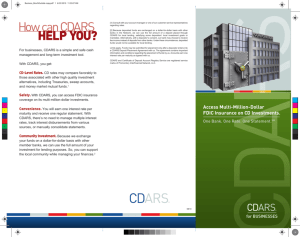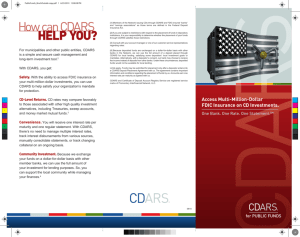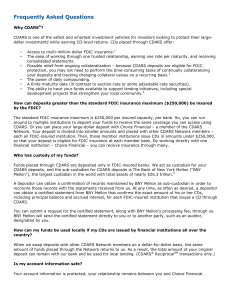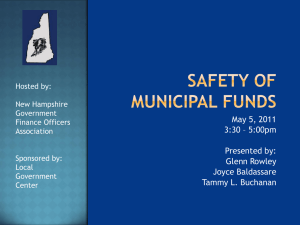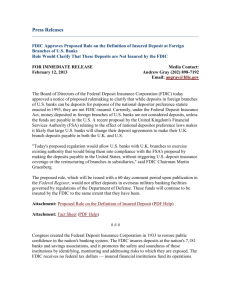CDARS Frequently Asked Questions
advertisement
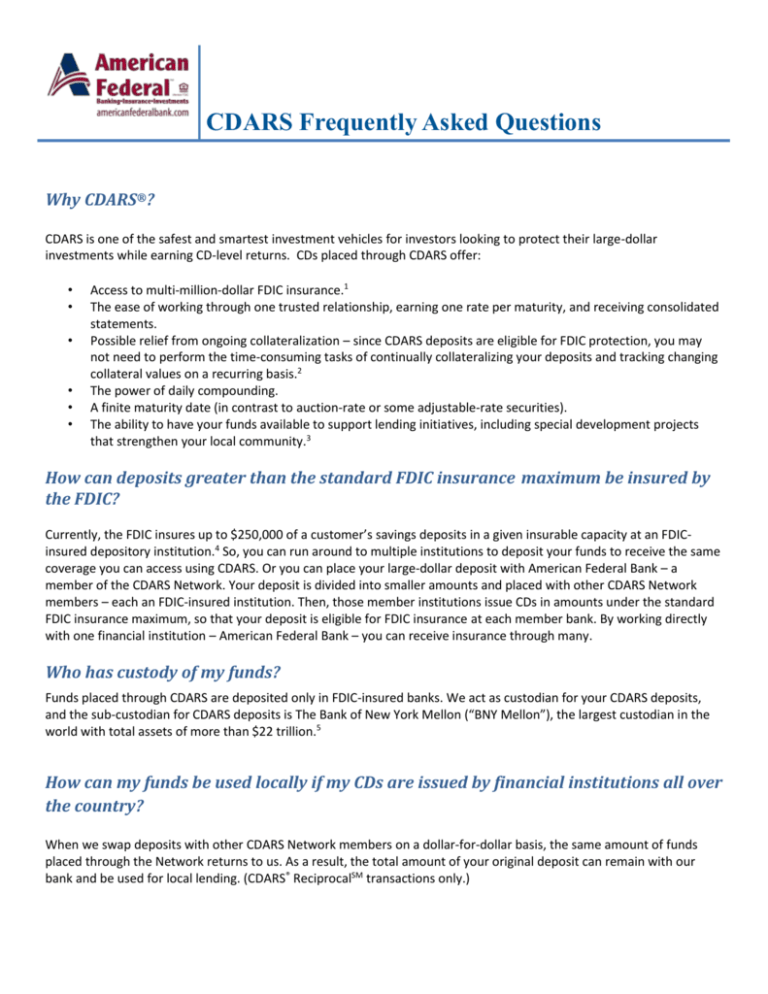
CDARS Frequently Asked Questions Why CDARS®? CDARS is one of the safest and smartest investment vehicles for investors looking to protect their large-dollar investments while earning CD-level returns. CDs placed through CDARS offer: • • • • • • Access to multi-million-dollar FDIC insurance.1 The ease of working through one trusted relationship, earning one rate per maturity, and receiving consolidated statements. Possible relief from ongoing collateralization – since CDARS deposits are eligible for FDIC protection, you may not need to perform the time-consuming tasks of continually collateralizing your deposits and tracking changing collateral values on a recurring basis.2 The power of daily compounding. A finite maturity date (in contrast to auction-rate or some adjustable-rate securities). The ability to have your funds available to support lending initiatives, including special development projects that strengthen your local community.3 How can deposits greater than the standard FDIC insurance maximum be insured by the FDIC? Currently, the FDIC insures up to $250,000 of a customer’s savings deposits in a given insurable capacity at an FDICinsured depository institution.4 So, you can run around to multiple institutions to deposit your funds to receive the same coverage you can access using CDARS. Or you can place your large-dollar deposit with American Federal Bank – a member of the CDARS Network. Your deposit is divided into smaller amounts and placed with other CDARS Network members – each an FDIC-insured institution. Then, those member institutions issue CDs in amounts under the standard FDIC insurance maximum, so that your deposit is eligible for FDIC insurance at each member bank. By working directly with one financial institution – American Federal Bank – you can receive insurance through many. Who has custody of my funds? Funds placed through CDARS are deposited only in FDIC-insured banks. We act as custodian for your CDARS deposits, and the sub-custodian for CDARS deposits is The Bank of New York Mellon (“BNY Mellon”), the largest custodian in the world with total assets of more than $22 trillion.5 How can my funds be used locally if my CDs are issued by financial institutions all over the country? When we swap deposits with other CDARS Network members on a dollar-for-dollar basis, the same amount of funds placed through the Network returns to us. As a result, the total amount of your original deposit can remain with our bank and be used for local lending. (CDARS® ReciprocalSM transactions only.) CDARS Frequently Asked Questions Is my account information safe? Your account information is protected; your relationship remains between you and American Federal Bank. What happens if a CDARS Network member bank fails? Most of the banks that have failed in the United States in recent years were not CDARS Network members or did not hold any CDARS deposits when they failed. When a Network member has failed, the bank’s CDs issued using CDARS in most cases have been transferred to a healthy institution – the FDIC’s preferred method for handling bank failures. In cases where the FDIC has been unable to find a healthy institution willing to accept such a transfer, it has arranged for the payment of the insured principal and accrued interest to the depositors. This payment has usually occurred in a matter of days. Please go to http://www.fdic.gov/deposit/index.html to learn more about FDIC insurance. [1] Limits apply. Funds may be submitted for placement only after an investor enters into a CDARS Deposit Placement Agreement with our bank. This agreement contains important information and conditions regarding the placement of funds. [2] If an investor is subject to restrictions with respect to the placement of funds in depository institutions, it is the responsibility of the investor to determine whether the placement of the investor’s funds through CDARS or a particular CDARS transaction satisfies those restrictions. [3] Because deposited funds are exchanged on a dollar-for-dollar basis with other banks in the CDARS Network, our bank can use the full amount of a deposit placed through CDARS for local lending, satisfying some investors’ local investment goals/mandates. Alternatively, with an investor’s consent, our bank may choose to receive fee income instead of deposits from other banks. Under these circumstances, deposited funds would not be available for local lending. [4] The standard FDIC insurance coverage amount is $250,000 per insured capacity per bank through December 31, 2013. Thereafter, the standard FDIC coverage amount will revert to $100,000 unless Congress further extends the higher coverage amount. Accordingly, for CDs that mature on or before December 31, 2013, customer funds will be allocated to banks that are members of the CDARS Network in amounts up to $250,000 and for CDs that mature after December 31, 2013, customer funds will be allocated in amounts up to $100,000. [5] *As reported by BNY Mellon in December 2009. Please see www.bnymellon.com/foresight/readcounter.cfm?id=tl064&lb for details. CDARS is a registered service mark of Promontory Interfinancial Network, LLC.
